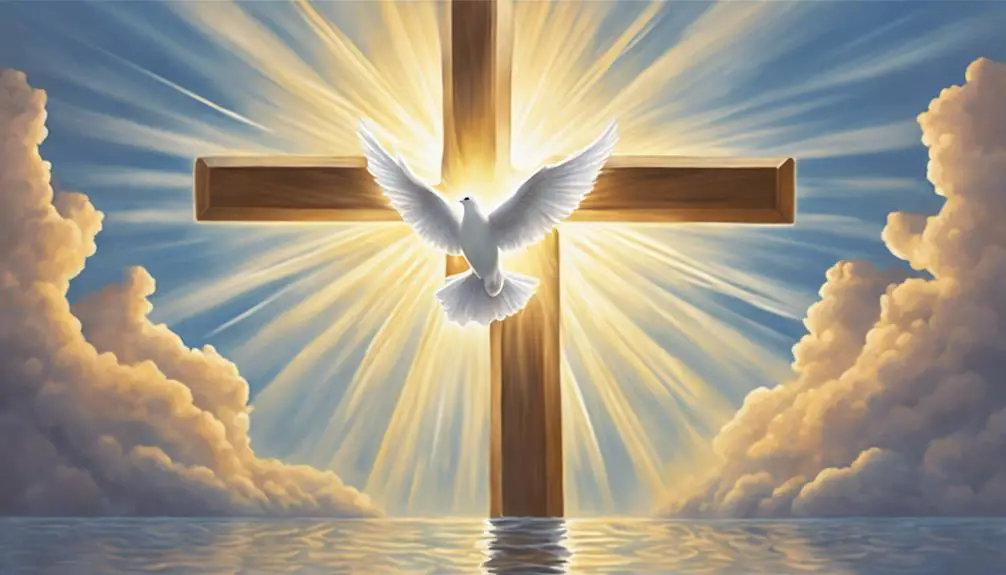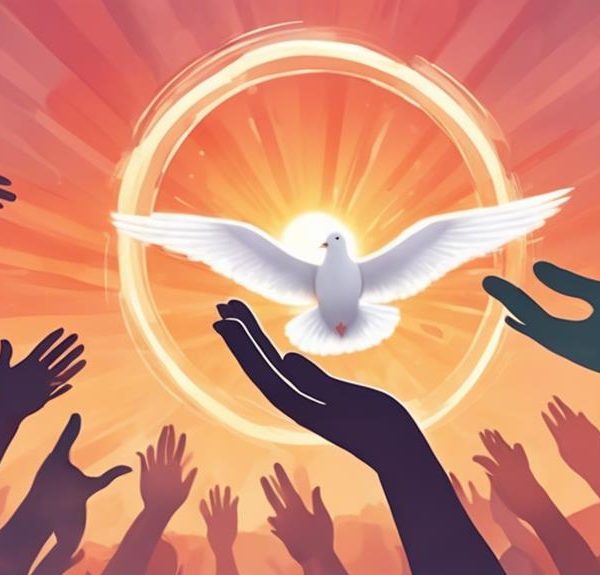Symbolizing new beginnings, the number 8 in the Bible unveils deep layers of resurrection and grace, inviting you to discover its divine secrets.

The Number 8 in the Bible Means
Just as Noah emerged from the ark into a world reborn, the number 8 in the Bible symbolizes new beginnings and resurrection.
You've likely noticed its presence in key biblical narratives, from the eight people who survived the flood to the timing of circumcision on the eighth day, pointing to a deeper layer of spiritual renewal and grace.
This number's connection to pivotal moments of transformation and its reflection of God's grace may prompt you to look beyond the surface.
Uncover the layers, and you'll find compelling insights into the divine design and its implications for faith and life.
Key Takeaways
- The number 8 symbolizes new beginnings and resurrection in biblical narratives.
- It signifies the covenant of circumcision on the eighth day, integrating individuals into the faith community.
- Easter and baptism, associated with the number 8, represent spiritual rebirth and awakening.
- Eight people saved in Noah's Ark embody themes of renewal, judgment, and salvation.
Symbol of New Beginnings

In biblical symbolism, the number 8 represents a profound emblem of new beginnings, marking phases of renewal and regeneration. This numerical motif recurs throughout the Scriptures, manifesting in various contexts that underscore renewal themes. You'll find that 8 isn't just a number but a symbol laden with meaning, especially when you delve into the rites and narratives that define significant transformations.
One of the most compelling illustrations of this is the significance of Baptism. In Christian doctrine, Baptism isn't just a ritual but a sacramental gateway to a new life. It embodies the washing away of the old self and the rebirth of the individual into a new creation. This rite of passage aligns perfectly with the symbolism of the number 8, as it epitomizes the transition from death to life, from bondage to freedom. The act of submerging and emerging from water mirrors the biblical flood narrative, where the earth was cleansed and renewed after 8 people, representing a new beginning for humanity, emerged from the ark.
Analyzing these instances, it's clear that the number 8 serves as a powerful emblem of renewal and regeneration, deeply intertwined with the core themes of faith and redemption.
Representation in Circumcision
Another profound manifestation of the number 8's symbolism in biblical contexts is its integral role in the rite of circumcision, which marks a covenant and a new beginning for the individual within the faith community. This practice, commanded to Abraham and his descendants, underscored the covenant significance between God and Abraham's lineage. Circumcision on the eighth day not only complied with health insights unknown at the time but also imbued the act with deep theological meaning.
Aspect |
Significance |
Relation to Number 8 |
|---|---|---|
Timing |
Eighth day after birth |
Symbolizes new beginnings |
Covenant |
Agreement with God |
Eternal bond |
Abraham |
Patriarch of faith |
His descendants' rite |
Health Insight |
Safest time for procedure |
Divine wisdom |
Community |
Integration into faith community |
A new start |
This rite signifies more than a physical act; it represents a spiritual rebirth and a deliberate entrance into a covenant community. The selection of the eighth day is especially significant, embedding the number 8's symbolism of new beginnings and eternal covenants within the very fabric of Abraham's descendants' identity.
Connection to Resurrection

Exploring further, the number 8's significance extends to its symbolization of resurrection and new life, a key element in Christian theology. This connection is particularly evident when considering the Easter significance. Easter, commemorating Jesus Christ's resurrection, falls on the first Sunday after the first full moon of the vernal equinox, often landing near or after the eighth day of April. This timing imbues the number 8 with a deeper resonance, aligning it with themes of rebirth and renewal inherent in the resurrection story.
Moreover, the symbolism of Baptism further illustrates the number 8's association with new beginnings. In Christian practice, Baptism represents the believer's resurrection from the old life of sin to a new life in Christ. Traditionally, many Christian denominations prefer to conduct baptisms on Easter Sunday, reinforcing the connection between the number 8, resurrection, and renewal. This ritual, therefore, not only marks a personal transformation but also ties individual faith journeys to the broader narrative of resurrection encapsulated in Easter's significance. Through these layers of meaning, the number 8 emerges as a powerful symbol of rebirth and spiritual awakening within the Christian faith.
Eight People in Noah's Ark
Significantly, the Bible records that exactly eight people were saved in Noah's Ark, underscoring the number's symbolic importance in representing a new beginning. This narrative, deeply embedded within the fabric of biblical history, illustrates a pivotal moment where family salvation intersects with global judgment.
The story of Noah's Ark isn't merely an account of survival amidst a divine flood but a profound demonstration of how a select few, through their righteousness and obedience, were chosen to perpetuate humanity. This act of saving Noah's family while executing judgment upon the world highlights a dual theme of mercy and justice. The family's preservation underscores the concept of family salvation—where an entire household is saved, suggesting that the bonds of family can carry a spiritual significance that transcends individual salvation.
Moreover, the global judgment that necessitated the Ark's construction speaks volumes about the moral state of the world at that time. It's a stark reminder of the consequences of widespread moral decay and the lengths to which divine justice can go in resetting the moral compass of humanity.
In this context, the number eight transcends its numerical value, embodying themes of renewal, judgment, and salvation on both a personal and global scale.
Reflections of God's Grace

The concept of God's grace in the Bible is multifaceted, reflecting divine mercy and favor that's unearned by humanity yet generously bestowed. This grace is a testament to God's infinite love, a central theme that resonates deeply within the biblical narrative.
To further understand how the Bible reflects God's grace, consider the following aspects:
- Divine Mercy: God's grace is often depicted as a form of divine mercy, where forgiveness and compassion are extended to humanity despite their shortcomings.
- Infinite Love: The infinite love of God is foundational to understanding His grace. It's an unconditional love that surpasses human understanding and is freely given.
- Unearned Favor: God's grace isn't something that can be earned through deeds or merits. It's a gift that underscores the benevolence of God's character.
- Generous Bestowal: The generosity of God's grace highlights His desire to bless and uplift humanity, demonstrating a profound commitment to the well-being of His creation.
Through these elements, it's clear that God's grace is a powerful reflection of His divine mercy and infinite love, revealing the depth and breadth of His compassion towards humanity.
Frequently Asked Questions
How Does the Number 8 Relate to the Architectural Design and Layout of the Tabernacle or Solomon's Temple in the Bible?
When examining how the number 8 influences the architectural design of the Tabernacle or Solomon's Temple, you won't find direct correlations with circular dimensions or priestly garments. Instead, the significance of 8 often relates to thematic elements and symbolic meanings rather than physical architecture.
It's essential to look beyond literal interpretations and consider how numerology and symbolism interplay with religious texts and structures, offering deeper insights into their spiritual and functional designs.
Are There Any Specific Feasts or Festivals in the Jewish Tradition That Particularly Associate With the Number 8?
You're exploring Jewish traditions and discover that the number 8 holds special significance.
In the circumcision ceremony, it symbolizes a covenant with God, performed on a male infant's eighth day.
Similarly, Chanukah, a festival of lights, illuminates lives for eight days, celebrating a miracle.
Both practices weave a rich tapestry of faith and tradition.
Analytically, these observances underscore the number 8's profound role in Jewish cultural and religious identity.
How Is the Number 8 Represented or Interpreted in Biblical Numerology Outside of Judeo-Christian Texts, Such as in the Traditions of Gnosticism or Kabbalah?
You're exploring how the number 8 is interpreted in traditions like Gnosticism and Kabbalah, beyond Judeo-Christian texts.
In Gnostic cosmology, the number 8 signifies the higher realms beyond the physical, representing a transcendental state of consciousness.
Meanwhile, in Kabbalistic tradition, the sefirot are referenced, though the number 8 doesn't directly correspond to a specific sefirah, its essence influences the mystical interpretation of spiritual completeness and cosmic order.
Can the Significance of the Number 8 Be Linked to Any Specific Prophecies or Visions in the Books of Daniel or Revelation?
You're exploring if the number 8 ties to prophecies in Daniel or Revelation. While it doesn't directly link to specific visions, its significance can be seen elsewhere.
For instance, the Eight Beatitudes in Matthew present foundational Christian virtues, reflecting renewal themes. Similarly, Noah's Ark, with eight survivors, symbolizes new beginnings post-flood.
These examples, rather than direct prophetic connections, illustrate the number's broader thematic relevance in biblical stories of redemption and renewal.
Beyond Its Biblical Context, How Has the Symbolism of the Number 8 Influenced Christian Art, Literature, or Music Throughout History?
As they say, 'a picture paints a thousand words,' and you'll find the number 8's influence in Christian art, literature, and music profound. It's woven into the fabric of these mediums through the Eightfold Path and octagonal symbolism, reflecting themes of renewal and eternity.
This usage isn't just decorative; it serves as a deep, analytical nod to the number's historic and spiritual significance, enriching the cultural tapestry of Christianity.
Conclusion
In conclusion, the number 8 in the Bible symbolizes new beginnings, encapsulating themes from circumcision to resurrection, and from Noah's Ark to expressions of divine grace. It serves as a testament to the cyclical nature of renewal and redemption within the biblical narrative.
As you've peeled back the layers of its significance, it's clear that the number 8 isn't just a figure; it's a profound emblem of regeneration and divine benevolence woven into the fabric of biblical theology.



Sign up